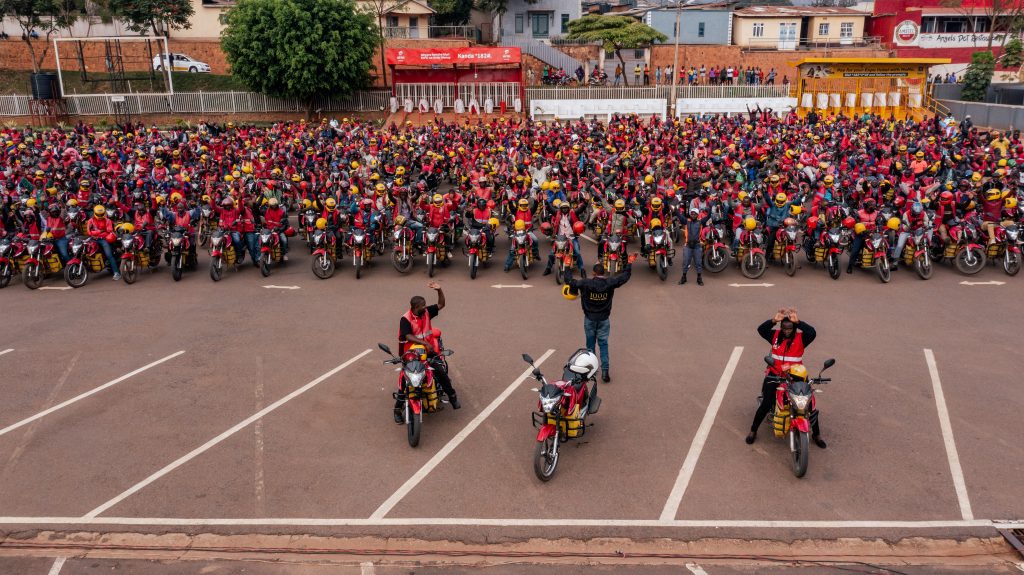By Stephen Macharia
In Nairobi, a city dominated by noisy and polluting internal combustion engine (ICE) motorcycles, Ampersand is leading a quiet revolution. Founded in Rwanda in 2016, Ampersand, an energy and mobility company that designs and deals in electric motorcycles, is transforming the commercial motorcycle sectors in Kenya and Rwanda.
Ampersand launched an initial modest fleet of 20 electric motorcycles in 2019, but today, there are over 1200 eco-friendly motorcycles in operation in both countries. AutoNews magazine sought to unpack the secrets behind this success and interviewed Hezbon Mose, Ampersand’s Kenya Country Director.
“We started in Rwanda because it is an ideal place to start and set up a business, as well as higher prices for fuel and motorbikes, and high daily mileage per boda. But to scale up, we expanded into Kenya, the largest economy in East Africa and home to 15 times more bodas than Rwanda,” shared Mose with his eyes lit up as he spoke about the Ampersand, electric motorcycles, and their potential impacts on the environment and economy.
At the core of Ampersand’s success, Mose noted, are custom-designed motorcycle batteries. While the motorcycle design is borrowed from traditional internal combustion motorcycles, Ampersand reimagined the battery and motor compartments to accommodate lithium Ion batteries.
“Our batteries, compared to others in the market, are more expensive but long-lasting,” Mose explained. Rather than selling the batteries outright, the company leases them to motorcycle owners. This not only assures customers of the battery quality but also reduces the initial cost of ownership
By operating the batteries as a service, Ampersand has introduced a model that allows riders to pay for the cost of energy rather than upfront investment in a battery. To support this model, Ampersand has established over 10 battery stations in Nairobi that also act as swapping stations. Battery attendants remove depleted batteries and install fully charged ones (within 3 minutes), ensuring riders can return to the road with minimal downtime.

To achieve this, Ampersand has partnered with TotalEnergies and installed many of its battery charging points/swap stations, at existing petrol stations. This collaboration not only provides riders with even more convenience but also demonstrates that transitioning to electric motorcycles is a sustainable choice.
The impact of Ampersand’s electric motorcycles on the environment cannot be overstated. Mose proudly revealed, “One electric motorcycle saves between 2 to 3 tonnes of carbon emissions annually. With our fleet of 1200 electric motorcycles operating in Kenya and Rwanda, we have already saved over 2000 tonnes of carbon emissions. That’s a significant step towards a cleaner and greener future.”
While electric motorcycles may have a higher upfront cost, Mose is quick to highlight the considerable savings they offer in operational expenses. “An electric motorcycle saves approximately 45% on energy cost. In just three months, owners can recoup the price difference compared to traditional motorcycles,” he asserted.
To ensure that boda boda operators, who form a significant portion of the motorcycle market, can afford these electric motorcycles, Ampersand is working closely with financial partners to provide accessible financing options. By doing so, they hope to empower individuals to switch to e-mobility.
But as with any new technology, misconceptions abound. Mose acknowledges that Ampersand faces challenges in dispelling certain myths. Range anxiety, for example, is a common concern, but Ampersand is actively addressing this by expanding its network of charging stations. Another misconception is the fear of the unknown, as some people doubt the power and performance of electric motorcycles. Mose is eager to set the record straight, stating confidently, “Our motorcycles are not only powerful but even more so than their ICE counterparts.”
As part of Ampersand’s customer experience, the company offers warranties on the battery, electric motor, and other essential parts of their motorcycles.
“Our motorcycles operate flawlessly even on flooded roads. The motor is water-resistant and capable of withstanding floods, rainwater, and other wet environments.” However, he did caution against careless washing practices with pressure washers/water blasters, emphasizing the importance of proper training to avoid motor malfunction due to water damage.
Beyond their technological advancements, Ampersand takes pride in their contribution to local employment. By training and employing local technicians to assemble their motorcycles, they not only create job opportunities but also ensure the expertise stays within the community. Mose highlighted this impact, saying, “The electric motorcycle sector continues to spur employment, even amidst high unemployment rates. We believe in empowering our people through skills development.”
In an era where safety and security are paramount, Ampersand is mindful of rider well-being. Mose revealed that all their electric motorcycles are equipped with telemetry technologies, enabling efficient tracking. This added incentive not only benefits riders in case of theft or accidents but also aids the government in its fight against crime, as all boda bodas can be easily traced. Mose urged boda boda operators to embrace the electric motorcycle revolution, emphasizing the benefits it can bring to individual owners and commercial operators alike.

Ampersand electric bikes are so good. What is it’s price in Kenya and how much is it on higher purchase?
They are so good. What distance does a battery cover before you exchange for a charged one?